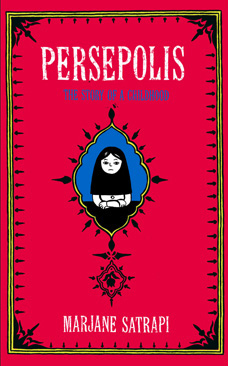
It has appeared on numerous “Best of” lists, including The Guardian 100 Best Books of the 21st Century, it has won multiple awards and weathered numerous challenges. Despite all that, Persepolis is still causing controversy twenty years after its publication date.
Long Island’s Commack High School removed Persepolis by Marjane Satrapi from their required reading list. Jordan Cox, the executive director of instructional services, declined to specify any reasons other than its “graphic nature” in some parts.
The decision was made months ago by a committee and announced at a community forum on June 8. Persepolis will still be available to read and for electives.
No Stranger to Challenges
Persepolis has faced many challenges in the past. In 2014 it made the American Library Association Top 10 Most Challenged Book List. As described in the CBLDF Using Graphic Novels in Education Guide:
Persepolis is the story of Marjane Satrapi’s childhood and coming of age within a loving, educated family that lived in Tehran during the Islamic Revolution and Iran-Iraq War. It is drawn in simple, stark, black and white ink with style, poignancy, and elegant detail as well as occasional flourishes (usually in the dream sequences) traditionally found in Eastern art.
CBLDF has taken action and reported various challenges to the graphic novel over the years, including California, Texas, Oregon, and most infamously, the Chicago Public School District. Time and again, the challenges have focused on language and graphic imagery.
In the recent complaint at Commack High School, one parent described the book as “pornographic.” It is another example along these same lines that falsely equates nudity to pornography and takes single images or phrases out of the context of the complete work.
Controversy in Commack
Tensions have been high this past month for the district. During an open forum on June 8, parents and students were at odds over the multiracial curriculum of the school. Students returned to the board meeting on June 10 to voice their concerns about the lack of attention to ethnic studies and the lives of minorities in the United States.
One student voiced their concern about the removal, saying there are not enough books written by or about people of color in the curriculum. Removing Persepolis is further white-washing their choices and denying them exposure to material that encourages critical thinking and respect for other cultures.
Charles Shulz, the secondary school english director for Commack High School, fought for the book in the committee meeting. “We know how much the students respond to it, we know how much meaning they take from it, especially when it comes to learning about the world outside Commack and Long Island.” It was recently announced that Shulz would be reassigned to the elementary level in the district. Reportedly, the district spokesperson would not comment on the reassignment.
The Elephant in the Room
Commack High School brings to light the elephant in the room when it comes to book challenges; the problem of the comic.
Of all the books on the required reading list at Commack High School, it appears only Persepolis was downgraded. No question was raised about the validity and appropriateness of other books on the required reading list, such as The Things They Carried, The Handmaid’s Tale, or The Catcher in the Rye. Among all three books, they feature assault, torture, and F-bombs. Comics and graphic novels are often held to a harsher standard than text.
Time and again, books squeak through the decency requirements while graphic novels are challenged. This is not a proposal to remove the books as well. It is a testament to the power of comics and the misconceptions surrounding them.
One reason comics are targeted is their visual nature. Comics are more accessible to readers and are great for relaying complex ideas. Additionally, accessibility opens the work to criticism of individual elements without the need to engage the work as a whole or understand its context.
Another roadblock is the stigma that the comic arts still carry from the days of Wertham. Some view them as lowbrow material for kids. An assumption that comics are only for kids can lead to seeing complex adult subject matter as inappropriate for the medium. Detractors aren’t capable of wrapping their heads around the idea that comics have many benefits including, increasing visual literacy, vocabulary, and observation and inference skills.
One can see how committees that view comics as second-class literature will be more willing to get rid of the material instead of engaging with it. Part of our mission at CBLDF has been to both raise awareness about the validity of the comics arts and support the librarians and educators who are championing the medium.
Downgrading
This is not a case of censorship — yet. However, certain markers make it very suspicious. One can even speculate that removing the book from required reading but not banning it is a ‘soft censor.’ A way to sweep the material under the rug without raising attention. CBLDF has reached out for further information, and we’ll be following the situation for updates. Below you can find our resources for Persepolis as well as the memorable challenges throughout the years.
Resources
Adding Persepolis to Your Library or Classroom Collection
Using Graphic Novels in Education: Persepolis
Panel Power: Using Comics to Make Lifelong Readers
Notable Persepolis Challenges
VICTORY: Illinois Challenge to Persepolis Fails by Unanimous Decision
Censorship 2013: Student Protest Saves Persepolis in Chicago Public Schools
Grad Student Uncovers Truth About Persepolis Ban in Chicago Public Schools